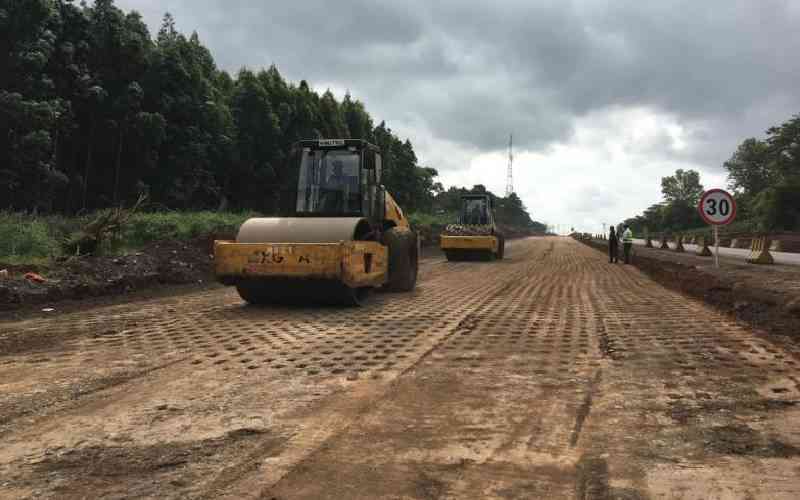President Willam Ruto (second right) during inspection of the Boma Yangu Vihiga estate housing project in Vhiga county, on October 4, 2025. [PCS]
Delivery of goods and services to the people of Kenya is the heartbeat of public service. It is the link between promises made by the government and lives changed on the ground. In Kenya today, that link must be tested in the lived reality of citizens, on the roads they use, in the hospitals they visit, in the time it takes for a public project or programme to move from paper to presence to impact.
For this to happen, the government works to ensure that what is planned is actually implemented, and that what is done makes a difference. In recent months, the Office of the Deputy Chief of Staff, Delivery and Government Efficiency, through the Government Delivery Unit (GDU), has led targeted project inspections across counties, documenting progress, uncovering areas where delivery has stagnated and trouble-shooting to resolve challenges in the implementation process.
In several counties, there were various stalled projects caused by a range of issues, including contractors facing capacity challenges, challenges in the tender process, or delays in mobilisation of equipment and labour for works. To address this, the Office of the Deputy Chief of Staff, Delivery and Government Efficiency has been at the forefront, urging implementing government agencies to improve contractor evaluation frameworks and discourage repeated non-performance amongst contractors. This is aimed at improving project management and delivering quality outcomes for all Kenyans.
Follow The Standard
channel
on WhatsApp
Previously stalled projects which the Office of the Deputy Chief of Staff, Delivery and Government Efficiency has assisted in trouble-shooting include the Oloitokitok Tomato Agro-Processing Factory, construction of the Gilgil market and other infrastructure projects within Nakuru County and construction of a Science Complex and dormitories at Nairobi School. The trouble-shooting process brings together multitude of key stakeholders involved in the project and is aimed at ensuring that the projects are implemented as planned and are completed on time. In the case of the Mamboleo–Miwani–Chemelil–Muhoroni–Kipsitet corridor, the 122-kilometre stretch is a key transport link for Kisumu county and the surrounding sugar belt.
The project has been revived in line with the Government’s Bottom-Up Economic Transformation Agenda (BETA), which prioritises the maintenance and expansion of critical transport corridors to support trade and service delivery. Renewed progress on the project has brought relief to local communities and helped restore economic activity in the region.
The GDU’s verification of progress in implementation of projects and programmes is critical in ensuring that they are on track to meeting their objectives and goals. Project progress reports, however critical and no matter how convincing, must be backed by reality on the ground. This is the reason teams are dispatched to project and programme implementation sites in order to confirm progress. Are the structures up? Are traders preparing to move in? Are timelines being met? Are key stakeholders part of the implementation process? What do the locals think about the project or programme? All these and many more checklists assist in accurately capturing progress and identifying core implementation bottlenecks.
However, citizens are essential partners and stakeholders in the government’s mission to monitor projects and programmes. During recent inspection tours, members of the public stepped forward to share insights that helped expose gaps and highlight areas needing urgent attention.
In some instances, members of the public, long seen merely as passive observers of the implementation process, have pointed out key gaps in project design which has provided invaluable information in redesigning projects and programmes or extending them to address the gaps. Such feedback, which is often seen as complaints, is being taken seriously and follow-up action is taken to inform decisions made on the ground.
One prominent aspect which has been clear in all project inspections is that timelines matter. A school project delayed by one year is a class year missed by students. A stalled road is more than an inconvenience. Delay is a threat to commerce, healthcare access, and overall national productivity. Delivery of government projects must therefore be measured by not only how efficient they are but also how timely and impactful they are on their targeted beneficiaries.
Challenges in project implementation, while to be expected should not be viewed as an excuse. Yes, budget cycles can be unpredictable. Procurement systems still need tightening. Capacity gaps remain. However, this administration has committed to transparency, impact, and responsiveness. We are laying the groundwork not just for today’s projects, but for a public service that understands that delivery is a permanent responsibility.
We are working toward a Kenya where service delivery is timely, efficient, and people-centred. From policy gaps to potholes, from inadequate funding to functionality of completed projects, we are working with all those involved to address challenges, improve efficiency and effectiveness. Because when the last mile is delivered, the first mile of transformation begins.
Follow The Standard
channel
on WhatsApp
By Eliud Owalo
